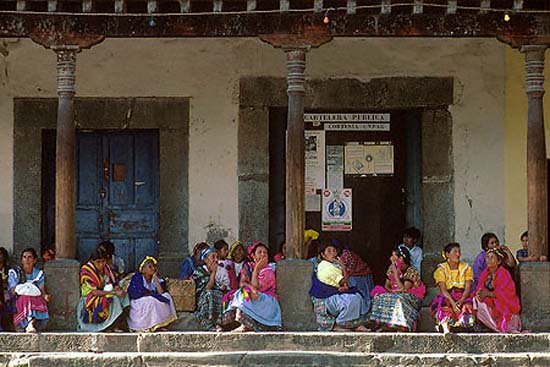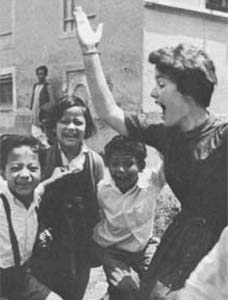
Stuart Conway has been living half in the U.S., half in Central America for about 25 years now. He and his wife Jennie Bramhall joined the Peace Corps, went to Guatemala for their honeymoon, and didn't come home for three years.
Reforesting Central America with Trees, Water and People
By Ed " Redwood" Ring
The best thing that ever happened to me was going to Central America to help treeplanters. I was fortunate to have a first-hand look at some of their finest work, when I went there with Stuart Conway, an EcoWorld Hero and co-founder of the reforesting group, Trees Water and People.
"Caben Tres" is a way to sum up Stuart Conway's driving in the hills of Guatemala, or Honduras, or El Salvador. He took me with him on a whirlwind two week tour of his tree nurseries and watershed protection projects in June 1998. The rainy season was just starting, the civil wars were over, and the roads were filled with sugar cane trucks with trailers so wide they seemed to overhang both shoulders of the road.
Caben tres is Spanish for "three fit," which was Stuart's amiable rejoinder whenever I'd ask him if he had to pass on blind curves. We tore through the outback of all three Central American countries in Toyota pickup trucks, from the hot, humid lowlands of Guatemala to rush hour in San Salvador. I guess it just wasn't our number, because we always got to the next stop in one piece.
When you see so many nurseries and so many lush forested hillsides, so many recovered year-round streams of water held and purified by new forests, so much good work for the earth and the people on it, you can believe it really might not be that hard for everyone to come together and save the earth.
At a park in the heart of San Salvador, I recall standing in a great shadehouse, with huge metal tubes supporting the shadecloth, arrayed like a row of giant croquet hoops. The structure was 20' high and 40' wide and nearly 100' long, and it was filled with baby trees. Many of the trees were seedlings in micro-thin plastic bags (bolsas), which were lined up side by side so when you looked down on them they formed a honeycomb. That place must have held 10,000 trees. Through the mesh you could see a soccer game being played in a dusty dirt field, with the nearby grass reserved for the spectators.
In the mountains west of Tegucigalpa, just upstream from the city of Suyapa, we visited a watershed where the forest was intact. Beautiful tropical pines marched up the canyon as far as the eye could see. In the northwest reaches of El Salvador, near the town of El Coco, we went to another watershed where the forest still existed. Hiking into the heart of this forest, the temperature cooled, and in the moist canyon bottom a running spring yielded water pure enough to drink on the spot. In both of these places, and elsewhere, new forests bordered the original forests. These deforested barren areas were filled with tree seedlings planted by communities that had realized that their water supply (as well as protection against landslides) depended on nurturing healthy and abundant forests.
Our job, besides visiting all of the tree nurseries and watersheds that Stuart had helped establish, was to take all of these projects under the umbrella of his new organization, Trees Water and People, headquartered in Ft. Collins, Colorado. To do that, we visited local foundations, mostly in the capital cities, as well as international aid organizations that had offices locally. Invariably Stuart would launch into a presentation in Spanish that I think I memorized by the time our trip neared the end. Not that I understood much of it, but I think I nodded at the right times.
Stuart Conway has been living half in the U.S., half in Central America for about 25 years now. He and his wife Jennie Bramhall joined the Peace Corps, went to Guatemala for their honeymoon, and didn't come home for three years. They lived and worked in a small town just south of the beautiful highland colonial city of Antigua. Since then, they return to Central America several times a year, specializing in helping small communities grow trees and protect their watersheds.
Stuart co-founded Trees Water and People (the name grows on you) in 1998 with Richard Fox, a veteran forest arborist, who specializes in North American forest preservation and watershed protection. Both of them moved with their families to Ft. Collins, Colorado, rolled up their sleeves and got their organization up and running. They work along with a small staff in a lofty 2nd floor suite in an old brick and timber building on College Avenue between downtown and the University. Towering Plains Cottonwoods hang huge limbs overhead (Cottonwoods decorate the whole city, and why they aren't planting new ones is beyond me), and just one block north the main train line intersects the street. If you call them and hear a roar in the background, it's just a freight train about two hours on the tracks from Denver.
Ft. Collins isn't quite yet a home away from home for me, but I've been there a lot as a volunteer. Have you ever spent an evening calling potential donors on the phone? There's a lot of ways to build a nonprofit, and that's one of them. At least I was in a cool room, up in their loft, with a big steam radiator and an old window you can actually open. And books about trees everywhere. It was quite a heavenly spot from which to make cold calls. One guy actually gave us $1,000 after a call. That was a good call.
Downtown Ft. Collins is one of the oldest, biggest little cities in Northern Colorado. There's really no other good sized towns between Denver to the south (and Boulder's grown into Denver), and Cheyenne, Wyoming to the north. With a bustling University and some high-tech companies moving in, the several streets of the old downtown get pretty lively at night. We ate once at the "Rio Grande", a venerable and one-of-a-kind old Mexican bar and restaurant. The Rio Grande has extremely high-ceilings with floor-to-ceiling windows, a huge spacious old bar, and a dining room that was half Victorian, half Southwestern. Nicely done. Powerful margaritas. Delicious hot spicy food.
When the folks at Trees Water and People aren't providing funds and expert assistance growing trees and protecting watersheds in Central America, they are working closer to home, protecting watersheds in the Rocky Mountains of the U.S. This is Richard Fox's area, and he brings to his work a lifetime of experience in forests throughout America, but mostly in the Rockies. In his time, Richard has had crews of planters where, using a special planting tool, each person could plant up to 1,000 trees per day. I didn't believe him, but we timed the motions, and I did the math. I guess it's true. We could have fun with this! One thousand people could plant a million trees a day. A billion trees in less than three years!
Planting trees is only part of the solution, though, and managing a forest and a watershed is complex work that is never done. Richard's trees and watershed protection has so far enlisted the support of communities throughout Colorado and Wyoming, mostly along the "Front Range," the eastern slopes of the Rockies.
Trees Water and People have several specific projects they are focusing on these days, one of the most interesting ones is helping a company in Nicaragua manufacture and sell fuel-efficient stoves. Stuart will be down in Central America again in November 2000; two weeks, four countries. Drive carefully, my friend!









